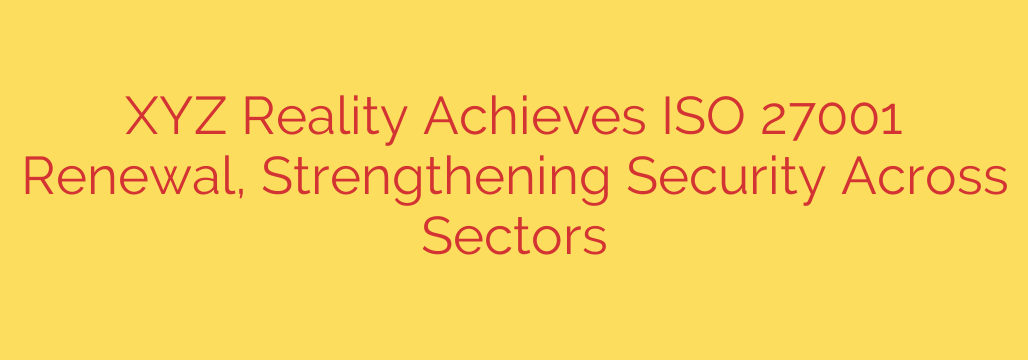
Protecting Your Most Valuable Asset: Why ISO 27001 Certification Matters for Data Security
In today’s digital-first world, data isn’t just important—it’s the lifeblood of your organization. From proprietary project blueprints to sensitive client information, protecting this data is no longer an IT issue; it’s a core business imperative. With the threat of cyberattacks constantly evolving, how can businesses demonstrate a genuine, verifiable commitment to information security? The answer lies in adhering to the world’s most recognized standard: ISO 27001.
Achieving and maintaining this certification signals a profound dedication to safeguarding digital assets, building a powerful foundation of trust with clients and partners.
What is ISO 27001, Really?
Many people have heard of ISO 27001, but its true scope is often misunderstood. It’s not just a checklist for your IT department. Instead, ISO 27001 is the international standard for an Information Security Management System (ISMS).
Think of an ISMS as a comprehensive, systematic framework for managing an organization’s security risks. It’s a holistic approach that embeds security into the very fabric of a company’s operations. This framework mandates rigorous processes for:
- Risk Assessment: Identifying, analyzing, and evaluating information security risks.
- Security Controls: Implementing a robust suite of controls to mitigate identified risks. This includes technical measures, policy-based rules, and physical security.
- Continuous Monitoring: Regularly reviewing the effectiveness of controls and adapting to new threats.
- Management Commitment: Ensuring that leadership is actively involved in and committed to the information security process.
Essentially, ISO 27001 provides a blueprint for establishing, implementing, maintaining, and continually improving information security within an organization.
The Continuous Commitment: Why Renewal is the Real Test
Achieving ISO 27001 certification is a monumental task. Renewing it, however, is a testament to an organization’s unwavering dedication. This isn’t a “one-and-done” award; it’s a dynamic process that proves a company’s security posture is not just a snapshot in time but a living, breathing part of its culture.
Maintaining the certification requires passing rigorous external audits on a regular basis. These audits scrutinize every aspect of the ISMS, ensuring that the company’s security practices are not only being followed but are also evolving to meet new challenges. This commitment to continuous improvement is what separates truly secure organizations from the rest, providing clients with the assurance that their data is protected by best-in-class, up-to-date protocols.
The Critical Impact on High-Stakes Industries
While data security is vital for every business, it is absolutely non-negotiable in sectors where intellectual property and sensitive data are the primary assets. For technology providers serving these industries, ISO 27001 is a critical differentiator.
- Construction & Engineering: Projects in this sector rely on complex, proprietary data, including architectural plans, engineering specifications, and site data captured by technologies like Augmented Reality. A breach could lead to catastrophic project delays, financial loss, and theft of intellectual property.
- Data Centers: As the physical heart of the digital world, data centers demand the highest levels of security. Partners and vendors working within these environments must prove their systems are fortified against any potential intrusion.
- Pharmaceuticals & Life Sciences: This industry handles some of the world’s most valuable information, including patented formulas, clinical trial data, and research and development secrets. Ensuring the confidentiality, integrity, and availability of this data is paramount.
When a technology partner holds an ISO 27001 certification, it tells clients in these critical sectors that their most valuable information is being handled according to the highest global standard.
Actionable Tips: How to Vet Your Technology Partners
As you evaluate new technology or software solutions, especially those that will handle your company’s data, make security a top priority in your vetting process. Here are a few key questions to ask:
- Are you ISO 27001 certified? Ask to see their certificate. This is the most straightforward way to confirm their commitment to a formal, internationally recognized security standard.
- How do you manage data access? Understand their policies on access control. Who can see your data, and under what circumstances?
- What is your incident response plan? In the event of a breach, a well-defined plan is crucial. A mature organization will have a clear, documented process for detection, response, and recovery.
- Can you provide security documentation? A partner confident in their security posture will be transparent and willing to share relevant documentation about their policies and procedures.
The Benchmark for Trust
Ultimately, information security is about building and maintaining trust. An ISO 27001 certification is more than just a badge; it is verifiable proof that an organization has invested in the people, processes, and technology required to protect its clients’ most valuable assets. In an era of increasing digital risk, aligning with partners who prioritize this standard is not just a good practice—it’s a fundamental requirement for secure and sustainable growth.
Source: https://datacenternews.asia/story/xyz-reality-renews-iso-27001-reinforcing-security-in-key-sectors








